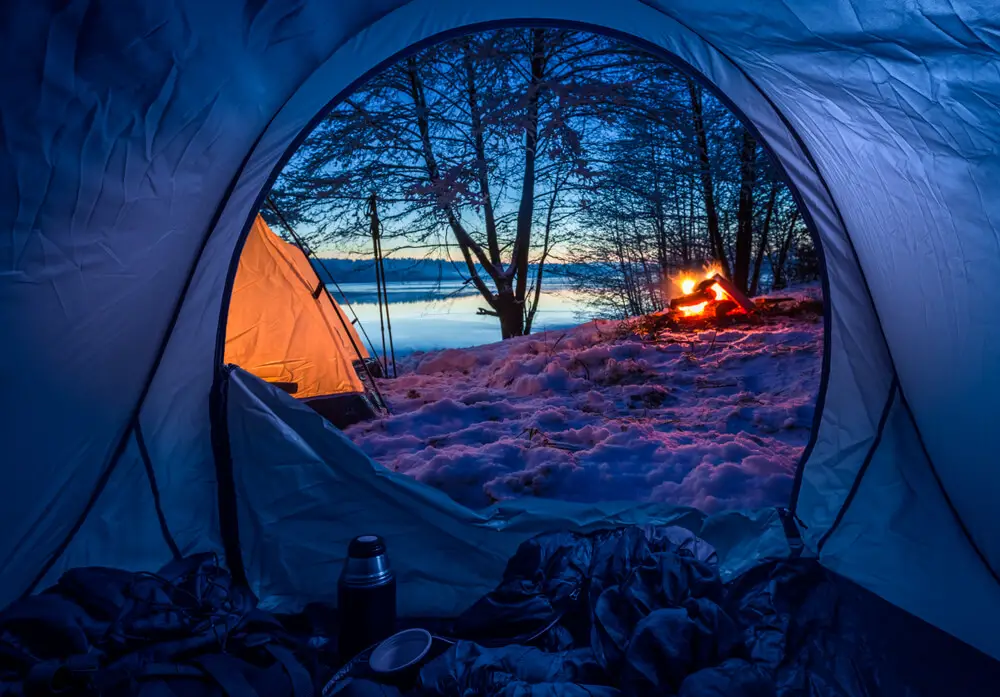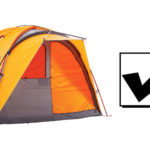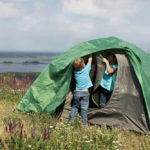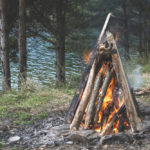Got a new tent you can’t wait to try out? Or better yet, a new RV that you’re itching to get on the road? Whichever way you choose to do it, camping is a fantastic way to enjoy the outdoors.
However, if you’re new to the game, you’ve probably got some questions. One of those might be “When does camping season start?” or “What’s the best time of year to go camping?”
Opinions on when the conditions are ideal for camping can vary widely from person to person. Today, we’re going to talk about the traditional definition of camping season--and why you may want to camp at other times in the year.
More...

Table of Contents
When Does Camping Season Start?
The answer varies depending on the region. If you live in an area with four distinct seasons, early May is when things usually kick off. Camping season lasts until around mid-October, with campground activity peaking in June and July.
Campgrounds typically close for the winter in places with cold winters, though some remain open and reduce their amenities when the cold weather arrives.
If you live somewhere where the weather stays mild year-round, you may be able to forget about the idea of camping season altogether. In places like Southern California, Florida, and Arizona (to name a few), it’s likely you’ll find campgrounds open all year.
What’s the Best Time of Year to Go Camping?
The best time of year to go camping is a matter of preference. There are plenty of factors to consider when deciding when to book your trip, such as:
- Crowds
- Campground prices
- Whether it’s rainy season or not
- Average high and low temperatures
- If you’re traveling with children
- Whether you want a relaxed camping trip or prefer to challenge yourself
For most people, the summer months are the best time to camp, so it’s no surprise that campgrounds fill up from mid-June to mid-August. Families are especially prevalent during this time, as they take advantage of summer vacation for some fun in the sun.
However, depending on where you live or where you plan to camp, the summer months aren’t your only option. Plenty of people prefer to avoid the summer crowds, instead choosing to camp during the shoulder months. September (and even early October in some places) is probably the best choice if your schedule is flexible.
And the good news if you love camping? Less-than-ideal weather need not stop you from enjoying the great outdoors. You can go any time of the year as long as you’re properly equipped. With the right gear, you can handle any temperature or weather conditions.
Understanding What Camping Is Like Each Season
So what can you expect when camping in each of the different seasons? Let’s take a look at each one.
Summer Camping
It’s no surprise that most people choose to camp in the summer--the reasons are obvious, starting with the weather. Warm temperatures mean you can be outside comfortably all day and not have to think about adding extra layers at night. You can enjoy water activities like swimming and water skiing, and there’s no need to worry about rain cramping your style.
But despite all the things that make summer camping so desirable, it’s not without its downsides.
It’s likely that you’ll have to contend with scorching temperatures and take care to avoid getting sunburned. You’ll also have to deal with annoying (and sometimes dangerous) bugs like wasps and mosquitos. And of course, if you go camping in summer, you’re likely to be in good company. Crowds can overwhelm your peaceful vacation or make it difficult to get a reservation.
Fall Camping
As fall approaches, the weather begins to cool down, and we start to see beautiful foliage, which is the perfect backdrop for camping for many.
There are plenty of reasons to go camping in the fall, and the lack of crowds is a big one. Once August is over, campgrounds typically become quieter, so if you prefer a more relaxed vacation, this is the time to go. Plus, most campsite owners drop their prices significantly after Labor Day, so you’re likely to pay a lot less than you would have just a few weeks earlier.
Then there’s the fact that by fall, most of the annoying summer bugs have retreated, so you can sit around a campfire more comfortably than during the dead of summer. And, of course, you’re likely to be treated to some gorgeous fall foliage. As winter begins to arrive, impressive tones provide the perfect backdrop to your camping trip.
The main drawback to fall camping is that the weather is a bit more variable. You might get rain, so you should be prepared to deal with that, and the weather will be colder. However, for some, cooler weather is not a drawback. If you hate the scorching hot weather that can make summer camping miserable, fall may be perfect for you.
Winter Camping
Okay, full disclosure: camping in the winter isn’t for everyone. And no, we’re not talking about camping in the winter in a place like Florida--we’re talking about camping somewhere where the temperatures are extreme.
There are plenty of things that make winter less-than-ideal for many people. If you’re camping in a tent, you’ll need special gear and equipment to stay comfortable. Depending on the region, there could be snow. There are also fewer hours of daylight, more possibility of storms and dangerous weather, and lots of places don’t offer winter camping.
However, those that do have some interesting advantages. For one, you are almost guaranteed to be alone. There are no bugs to worry about, and if you want to go for long, strenuous hikes, you won’t have to deal with being hot. If you have an RV, you have built-in protection from the elements, though you’ll still need some cold weather camping gear.
On the other hand, winter is a fantastic time to camp if you live somewhere with a mild climate. While temperatures might be a bit lower than normal, you should be able to camp without a problem.
Spring Camping
After the harsh winter months, spring presents interesting opportunities to get close to nature--you just have to be ready for some touch-and-go weather. In some places, it’s warm enough to camp comfortably in a tent, but temperatures are usually still cold and may be rainy. If you decide to camp in the spring, you should be ready for the weather of all kinds.
If you are, you will be rewarded with stunning foliage that you can enjoy with practically no crowds. And although water sports like wakeboarding are still a ways away, spring weather is usually fantastic for an array of outdoor activities. If you love going on strenuous hikes, spring weather is usually much more comfortable than oppressive summer heat.
Final Thoughts
As you can see, there is no one-size-fits-all answer to the question of “when does camping season start?”
In most places, summer is the height of the camping season, though the shoulder months and even the winter can be an excellent option. But remember--no matter when you camp, preparation is the key to enjoying your time in the great outdoors.
- Are Merrell Shoes Good? – An Unbiased Review of Merrell Footwear - December 9, 2023
- Where Are Merrell Shoes Made? - December 9, 2023
- Camping in 40-degree Weather: Tips and Tricks - September 25, 2023






![How Long Does Butane Canister Last? [Detailed Answer] How Long Does Butane Canister Last? [Detailed Answer]](https://grandcircletrails.com/wp-content/uploads/2022/04/How-Long-Does-Butane-Canister-Last-1-150x150.jpg)